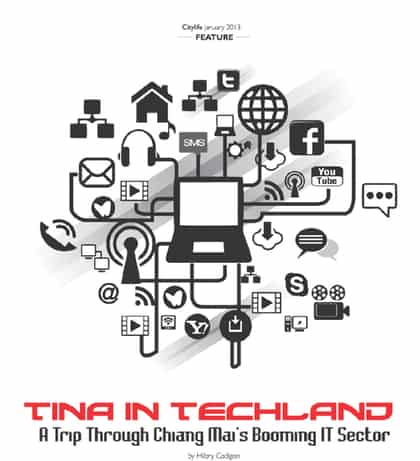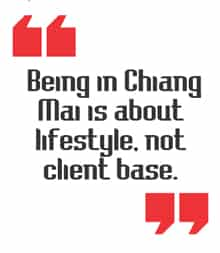
American entrepreneur Tina Neville came to Chiang Mai one year ago. Her husband had been working at the American consulate for a year before that, but Tina had stayed behind to work on fostering her start-up, Transcend Academy, a comprehensive college preparation company based in Washington, D.C. that just won a prestigious Stevie Award.
“When I arrived in Thailand, my identity was that of a trailing spouse,” says Tina. “I had my business back in D.C., but I didn’t know what to do in Chiang Mai.”
In an attempt to get more involved with the community, Tina went to the TEDx events at Chiang Mai University (CMU) and was inspired by the people she met and the things she learned there.
“I realised that there was in fact a tech hub here in Chiang Mai,” she says, “and it occurred to me that education, when combined with technology, can transcend boundaries.”
Tina spent her first months in Chiang Mai teaching GRE classes and speaking at local schools about resumes. It was here that she learned of many students’ shared desire to go to university in the States, and recognised that the American company she’d started just a few years before had potential to reach beyond borders. She realised that by taking her idea online she could expand in a serious way – a global way – and that Chiang Mai just might be the city to make that happen.
The Journey Begins
“Initially, I had no knowledge of the tech world,” Tina admits. “It was all foreign to me. But I’ve learned so much over the past year – it’s incredible!”
Of particular help to her was Mr. Network himself, Martin Venzky-Stalling of Chiang Mai Creative City (CMCC), who, upon learning of Tina’s idea, was able to put her touch with a variety of different people and companies around town that could help turn her ideas into reality.
“Finding the right people and things you are looking for can often be difficult in Chiang Mai,” Venzky-Stalling told me. “There’s a huge network out there, and our goal at CMCC is to improve its visibility and connectivity.”
And so, with CMCC’s directions, Tina set off on a self-guided tour of the city’s rapidly growing IT Sector. I followed in her footsteps, meeting an array of interesting characters and noticing a variety of industry trends along the way.
“What has impressed me most about Chiang Mai’s IT Sector is the friendliness of the network, and the completely un-American concept of sharing work and recommending competitors,” Tina said.
Her goal was to develop a web platform called CollegeAppz that would take her college prep services online. Her process reads something like a mix between Alice in Wonderland and the classic tale of Goldilocks and the Three Bears.
Tina started off too small, working with a group of former CMU students who helped her develop initial plans but did not have the capability to implement a large international project like hers. Then she went too big, heading to Aware Corporation, the largest and most experienced software company in Chiang Mai, which ended up being a bit over her budget. Finally, she settled on Mycos Technologies, a company that was, as the old story goes, “just right.”
Enter the Techpats
Tina’s first contact within the tech world was with Sven Ernst of Buzzwoo!, whom she met at an entrepreneurs’ conference where he was a speaker. “Sven gave me the layout of the software development world in Chiang Mai,” said Tina. “But he told me his company couldn’t take on CollegeAppz as they were at 120% capacity.”
Indeed, there seems to be no lack of work for the tech companies in Chiang Mai, particularly those who work with overseas clients. In Buzzwoo!’s case, clients are all international, and mostly German.
“For us, being in Chiang Mai is about lifestyle, not client base,” Ernst told me, echoing the sentiments of literally every techpat I interviewed. “I came to Chiang Mai as a backpacker and fell in love with the place, simple as that. All I had to do was find a way to stay.”
Indeed, Chiang Mai is on its way to becoming an international tech hub, perhaps solely for the fact that it’s a wonderful place to live, and techies have the flexibility to live and work pretty much wherever they want. However, having already founded such a high-profile company in Germany – with a client list that includes everyone from BMW to Nike – Ernst had to tread carefully when opening an office in Chiang Mai.
“I needed to ensure that I could uphold our expected level of quality,” he said. “But once we tested out the market, I realised there would be no problem. Our employees are mostly Thai, and prove that the stereotypes about Thailand are not true. They are very hardworking and reliable. We’ve been up and running for a little over a year now and things are going very well.”
A visit to the Buzzwoo! Asia office makes this pretty clear. The sunlit space is cosy and inviting, with whimsical drawings on the walls, a big second floor patio, and two lazy dogs lounging about. Overall, this was another quality that seemed to stretch across the board. None of the offices I visited resembled the tragic greyed out cubicle setups of the typical workaday schmuck. In fact, few of them resembled offices at all, aside from the preponderance of computers.

Cool Times in Chiang Mai
At Studio Iglu, a digital design agency located in owner Ozzi Jarvinen’s former home, big bright rooms surround a central courtyard complete with a carp-filled pond. “I want my employees to enjoy working here,” said Jarvinen. “Work hours are flexible, and new employees are welcome to live in our extra rooms until they find permanent residence. People hang out here after work. We have a bar!”
Jarvinen, whose clients and employees hail primarily from his native Finland, notes that Chiang Mai provides a welcomed break for Finnish programmers looking for a breath of fresh air.
“It’s easy to hire people in that sense. We recruit directly from Finland, and people are excited by the location and the change of pace,” he told me. “In Finland, the playing field is highly competitive. Guys come here at age 24 or 25, having already had their first burn-out. Things are tough over there; these guys are worked very hard. By contrast, Chiang Mai is a very relaxing and creative environment.”
In addition to the lifestyle benefits, there are definite financial incentives to start an international tech business in Chiang Mai as well.
“A Finnish newspaper came to Chiang Mai to interview us and said that high Finnish taxation [some of the highest in the world] is the biggest competitive advantage for an international company working out of Chiang Mai, like us. Here, taxes are much lower, and the cost of living is much cheaper too, allowing us to compete globally with lower rates,” said Jarvinen. “The only downside is the internet. It’s ridiculously bad.”
Overcoming Obstacles
Let’s recap. The good? Low costs and happy times. The bad? Slow internet.
Anything else?
“Pricing can be a bit of an issue because we are trying to be a world-class company, and do world-class work, so our prices should reflect that. However we don’t want to alienate local clients either,” explained David Williams, British expat and co-founder of the award-winning Chiang Mai design firm, Digital Zoo.
Furthermore, some customers can be snooty when it comes to the business location.
“I hate the word ‘outsource’,” said Williams. “We do all our work in-office, and we have a highly professional environment, but people tend to have trust issues when they see a business working out of Thailand – they are cautious and wary before they see our work.”
Luckily for Digital Zoo, the work they do produce rarely fails to impress. The company was founded by Williams and Thai national Pasu Kongprasertkit in 2007, and employs less than 10 people, all Thai except for Williams. In 2008, Digital Zoo placed second in the nationwide WOLDA world logo competition, and beat out agencies from megacities like Bangkok, Singapore, Tokyo, Beijing, and Hong Kong in the ‘Best of the Asian Continent’ category.
“First place that year went to the largest design firm in the world, so considering our size it was a very big deal to come in second,” Williams noted.
Williams arrived in Chiang Mai as a backpacker 11 years ago, securing a job teaching graphic design in order to stay. He quickly realised that Chiang Mai is a great city for design and technology.
“Thai people in Chiang Mai are highly creative. You only have to glance through the marketplaces to see the great deal of artistic talent that exists here. Lanna culture is focused on arts and crafts and Thai students are very dedicated and really absorb all the latest techniques. The slow pace of the city helps foster development because it gives people time to learn and discover new things.”
Thai Tech
A few years ago, CMU decided to help support students looking to turn their artistic and technological skills into rewarding careers. They set up the College of Arts, Media and Technology (CAMT) to cultivate what they call ‘International Knowledge Workers’. According to their website, the goal is to ensure that all graduates can “apply innovative knowledge into an international environment in order to foster the development of the knowledge-based economy.”
Remember Tina? As it happens, her next stop was the office of one of CAMT’s first graduates, an animation major named Tanaset ‘Puan’ Kullapatmongkol. Puan was a pioneer in the CAMT system, not only a member of the first graduating class, but also the first grad to start his own business on campus, a digital design and programming company called Me and Friends.
“I walked into the Dean’s room and asked if I could use some of their computer lab space to help get my business off the ground,” Puan told me. “He was very helpful.”
Puan’s business grew quickly enough that he has now moved into his own office on Canal Road. He passed the CAMT space onto the next class of graduates, who have opened their own animation and digital presentation business called Kaongai Media Studio.
“CAMT is trying to help graduates overcome some of the problems that arise when starting a novice business,” said Venzky-Stalling. “They provide resources, office space and support staff along with networking events, matching with foreign companies and internship opportunities.”
Despite the newly available resources that CAMT provides, a lot of what is required to really succeed in the industry must come from the students’ own tenacity. Puan helped fund his own English lessons by working as a freelance graphic designer and programmer throughout high school. Most of what he learned about that came from the internet, and from books.
“Schools teach us to code but they don’t teach us to think,” said Puan. “In order to succeed we need more. Technology is always changing and we can learn most of that on the internet. But we also need problem-solving skills, business skills, survival skills. We need to learn the importance of deadlines!”
Puan adds that he thinks there are specific cultural and governmental issues at play here that affect the learning curve.
“I always watch what’s going on in the world. People in Thailand aren’t fast enough learners,” said Puan. “One reason for this is lack of knowledge in English – we ranked last, after Burma! But it’s not because we’re lazy or stubborn. I think it’s because kids are just afraid of English. We need better education systems.”
Raising Awareness
What is clear is that technology, and the industries that support it, are moving at light speed, and the work required to keep up is endless.
“I was struck by the amount of business these companies are juggling _ there is no lack of work in this sector,” noted Tina. “If anything, there is a lack of qualified workers.”
True, said Steven Prussky, founder of the city’s largest IT firm, Aware Corporation, which employs over 60 engineers – nearly all Thai – at its Chiang Mai office. Prussky estimates that there is only one qualified person for every 8-10 open jobs in the industry, but stresses that this is a worldwide issue, not a Thailand one.
“Thailand is becoming first world,” he said, “and it’s dealing with the same problems that the rest of the world is dealing with. Globally, there are just not enough software engineers. Our education systems have not shifted fast enough to train people to enter this rapidly developing field.”
That being said, for Aware, business is booming. The company, which has a second larger office in Bangkok as well as branches in Canada and the US, has grown to be one of the top five largest IT firms in Thailand, and competes with the big guys in Bangkok as well as a slew of other international companies around the world.
“Most IT companies suck,” said Prussky. “The key is to suck less. Our business is not a sexy place to work, but what we do have is structure and stability. As a result, we are known for our integrity and accountability, and we grow.”
[ccm-image align=’right’]images.chiangmaicitylife.com/clg/wp-content/uploads/imported/citylife-ecmn/22-01/IT03.jpgHappily Ever After
At Aware, Tina was able to work with consultants who helped formulate her ideas into a set of concrete goals and strictures. CollegeAppz would have to be an online platform that could both stand alone or be embedded in a client’s website. The project would require a three to five man team of designers and web developers working for a three to four month period.
With a plan in mind, and further illustrating the complete lack of competitiveness in Chiang Mai’s techie network (techwork?), Tina was able to shop her more solidified plans to John Douglas, founder of Mycos Technologies, which has an office off Nimmanhaemin.
“Mycos ended up being the perfect fit for me,” said Tina. “I’d had early contact with John through CMCC, and he took a personal interest in my project since his daughters will be college-bound in a few years.”
Mycos was founded in 2001 and focuses on software development for small independent vendors. The 55-person staff is 100% Thai aside from its expat founder, but clients are all international.
“Tina’s platform needed to be taken to market quickly, but with the ability to iterate and pivot as market opportunities emerged,” said Douglas. “We have a competitive edge there.”
CollegeAppz is expected to be completed early this year, and Tina will be heading home to the States soon after. But Chiang Mai and the invaluable help it provided will not be forgotten. In fact, Tina has become so enamoured with the place that she hopes to someday open her own Asia office in Chiang Mai.
“I have some great interns working for me now,” Tina told me. “They’re all former Payap students and they all speak English and they’re all super impressive. I’d like to be able to hire some of them full time in the future.”
Ultimately, Chiang Mai will always be the place that turned Tina’s small American start-up into a worldwide web platform, one that she hopes will catapult her business into the global sphere, and allow her to help students from all over the world apply to colleges and get the first-rate educations they deserve.
“I am so grateful to Chiang Mai,” she added. “There is so much potential here, so many brilliant developers, so much passion.”
Indeed, the Thai government has recently declared Chiang Mai to be one of three ICT (Information and Communication Technology) cities of Thailand, and as resources improve and techpats flock, Chiang Mai’s status in the tech world continues to expand.
“The compelling thing about the software business for Asia is that it by-passes the old guard,” said Douglas of Mycos. “People in the industry don’t need to beg permission, have the right diplomas or family connections. It’s a pure meritocracy where anyone with a modicum of intelligence, a 300 dollar laptop, and sufficient drive can succeed.”
